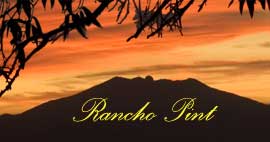|
Mexico's Belgian-Swiss Composer-in-the-woods on tour in the
USA
By John Pint
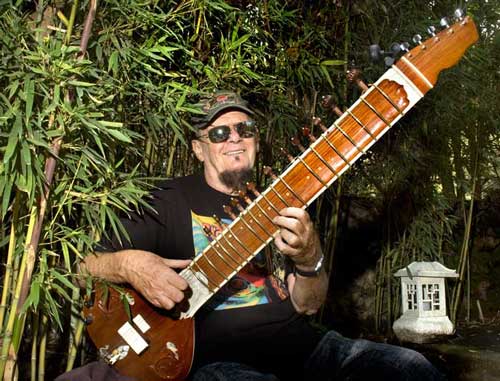 In a cabin at the top of a mile-high mountain in western Mexico,
surrounded by tall pine and oak trees, psychedelic music pioneer
Joel Vandroogenbroeck's alto flute, sitar and synthesizer
harmonize with the sounds of melodious mockingbirds and saucy
woodpeckers outside his window, as he rehearses for one of the
most unusual concert tours in musical history, featuring the
rebirth of his revolutionary band of the 70’s, Brainticket. In a cabin at the top of a mile-high mountain in western Mexico,
surrounded by tall pine and oak trees, psychedelic music pioneer
Joel Vandroogenbroeck's alto flute, sitar and synthesizer
harmonize with the sounds of melodious mockingbirds and saucy
woodpeckers outside his window, as he rehearses for one of the
most unusual concert tours in musical history, featuring the
rebirth of his revolutionary band of the 70’s, Brainticket.
Thanks to the enthusiasm and perseverance of Cleopatra Records
founder Brian Perera, Brainticket will tour the USA for the
first time (see sidebar) in August, 2011, along with vintage
space-rocking bands, Nektar and Huw Lloyd-Langton of Hawkwind.
“Brainticket is bigger than ever here in the US and influencing
new bands around the world—as far as Russia,” says Perera, who
recently succeeded in reissuing eight of Brainticket’s best
albums. “It’s great!”
Hoping to learn a few secrets about the man with the long and
mysterious name, I asked Joel Vandroogenbroeck when his musical
career began.
Out of the Dry Swamp
"My family name may be long, but it's not that mysterious if
you speak Dutch," says Joel with his characteristic, shy
smile. "My ancestors were among those daring folk who worked
against all odds to take land from the sea. Droogen means
dry and a broeck is a swamp." Though his forefathers may
have been Dutch, Joel VDB was born in Brussels, Belgium where he
started his musical career at the age of three. "There was a
piano in the house," he says, "so I just started to play it."
Following in Mozart's footsteps, Joel gave his first concert
when he was five years old, to a plaza full of American soldiers
who had come to liberate Belgium in 1944.
Joel's career came to an abrupt halt when he was thirteen: "I
hated the piano because they forced me to play it. I refused to
touch it, so my father sold it and for the next three years I
had nothing to do with music. But then a friend came to me with
a 78 rpm record in his hand. It was a new kind of music played
by people like Dizzy Gillespie, Charlie Parker and Thelonious
Monk. I listened to it and said 'Wow!'"
Jazz in the Congo
It was love at "first listen." Joel began to play Jazz on a
friend's piano, forgot about school and regularly slipped out
the window at night to frequent Jazz clubs which resulted in his
announcing to his parents, at age 17: "Goodbye folks, I'm off to
Africa." He had been accepted as bass player in a Jazz group
invited to play in what was then the Belgian Congo. From that
moment on, Joel toured Europe, started his own band and met Jazz
greats such as Quincy Jones and Stan Getz. He didn't give up
classical music, however, and continued studying in a
conservatory "until they discovered I was playing Jazz. Then
they kicked me out."
In time he broadened his musical horizons as he discovered
African and Indian music as well as the 60's sounds of the
Beatles, Jimi Hendrix, the Rolling Stones and later Hawkwind.
These influences eventually resulted in the evolution of the
group called Brainticket and their first album, Cottonwoodhill,
which was released in 1971. “We did this before the
synthesizer,” comments Joel, “and we actually used an untuned
short-wave radio to produce a lot of the surrealistic sounds in
the album.”
Listen at your own Risk
Brainticket took the world by surprise, but not exactly as the
musicians had hoped.. “The
record sold,” said VDB to Space-Rock historian Dave Thompson,
“but it was banned in far more countries than it was released
in, including the USA as far as I know.”
It seems the deliberately provocative liner notes for that first
album—invented by the publisher and unbeknownst to the
musicians—warned buyers to listen to the record only once a day,
lest their brains be destroyed.
But in time, the world woke up.
According to The Crack in the Cosmic Egg, the encyclopedia of
German electronic music, “Brainticket is one of the most revered
and quoted of psychedelic albums. For 1971 it was nothing less
than revolutionary… a strange and unique album that’s still
surprisingly startling and fresh today.” The co-author of this
book, by the way, Alan Freeman, is a member of Nektar and will
be among the musicians touring the USA along with Brainticket in
August and September, 2011.
In 1972, Brainticket moved to Italy and produced a “brighter and
friendlier” album, Psychonaut, with a remarkable painting by Umberto Santucci on the cover, which,
in every detail, says Joel, described his psychological world
perfectly. A year later
came a new album entitled Celestial Ocean, inspired one day when VDB was reading the Egyptian Book of the Dead. According to Dave
Thompson, this LP and Cottonwoodhill represent “what Joel
Vandroogenbroeck still considers to be the definitive
Brainticket experience.”
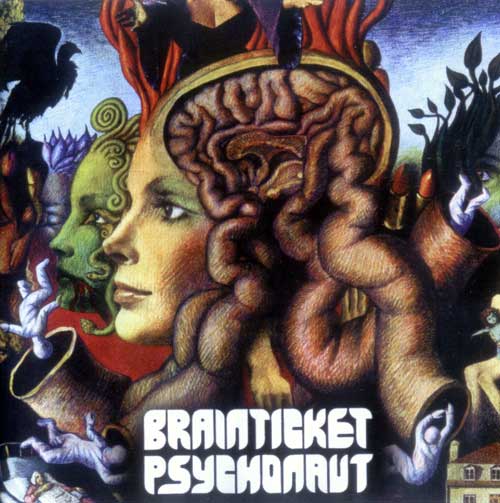
Joel enjoyed the warm weather and la dolce vita in Rome.
He played music with Mussolini’s son, recorded
pieces for Ennio Morricone, and once had a cappuccino with
Federico Fellini.
Somehow, in that stimulating environment, Joel Vandroogenbroeck
heard the call of Bali. "In Bali they have a collection of
instruments──mostly percussion──known as the gamelan. The
music that they play is very important for their religion.
They're obliged to play it and that's why everyone is so
artistic. They have to make music morning, noon and night;
there's no way out! So they shut off the radio and start to
play. They even have special instruments that are only played at
night and in the privacy of the home. By the way, out of Bali
came what we call minimalist music today, the kind of music
played by Philip Glass and Steve Reich."
Building a Bamboo Bumbung
In Bali, Joel learned both to play and to manufacture curious
instruments. "They think that if you construct your own
instrument, you have more affinity with it. I became specialized
in the joged bumbung, bamboo tubes hung like vibraphones
or marimbas. They cut parts of the tube away and tune the hollow
section to resonate with an adjacent tongue. The two parts have
to be almost but not completely in tune. The sound is fantastic.
And this is played with hammers made of bamboo and recycled
tires! Another instrument they have is the selunding.
It's made of metal and many of them come from the cut-up walls
of sunken ships.
"So I went back to Switzerland and started a Joged Bumbung Band.
Everybody thought I was crazy, but it was a big success. We even
did concerts accompanying these Balinese instruments with gongs,
strings, flutes and other classical instruments, which made a
very good combination. I would like to do something like this
here in Mexico; it's such happy music."
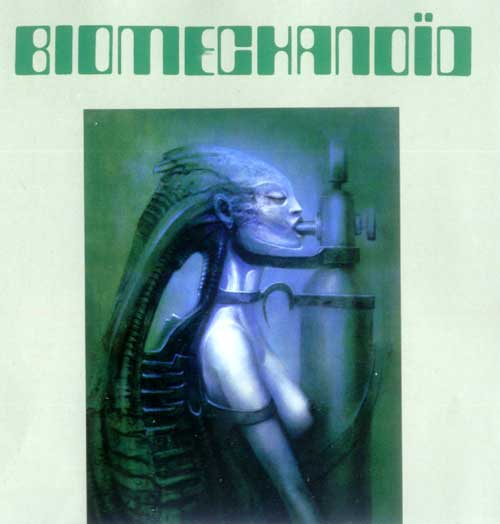
Vandroogenbroeck's Biomechanoid, released in 1980, features this
painting on the cover by Swiss graphic artist H.R. Giger,
most famous as the designer of Alien. "I did the music for a
short documentary on Giger's work," says Joel, and later he
presented me with this painting."
Magic in Mexico
Joel claims he first came to Mexico "by accident." The roots of
this accident are in a composition of his called Animal Farm,
which won first prize in a Japanese competition for the best
electronic music. This resulted, in 1984, in his being invited
to San Francisco for three months by the Djerassi Foundation,
along with other Swiss artists. "I loved San Francisco and
wanted to stay for an extra month, but the dollar was so high
(in relation to the Swiss franc) at that time that we had no
choice but to go back home. But then somebody told us, 'Why
don't you go to Mexico? There was a devaluation yesterday: more
than sixty percent!' So we took the train to Los Mochis and
stopped in Creel where I experienced a real case of culture
shock. I saw pistoleros and Indians and felt like I had gone 200
years into the past. Eventually we reached Guadalajara where I
made friends and spent a month in Ajijic, which I found
fascinating. I was so impressed that I came back again year
after year and then one February I returned to Switzerland and
found temperatures of ten below zero and a meter of snow.
Somewhere under that snow was my little white car but it took me
two days to find it. And that was it. I said, 'No more winter!'
I sold everything, gave away or burned the rest and came to live
here. And I like it──there's something magic about Mexico."
There's something magic about Joel Vandroogenbroeck's music too.
Take his Coyote Song which was written one dark night in
Woodland Hills near San Francisco...
Coyotes in the Mist
"I was all alone in a farmhouse, working on a composition with
my instruments, computer and tape recorder. Outside was the
heaviest fog I have ever seen. All of a sudden I heard a weird,
mewling noise. It was a pack of coyotes, but I didn't recognize
the sound because we don't have these animals in Europe. 'What
in the world is this?' I said. Then I screwed up my courage,
opened the door and started recording that incredible concert.
The coyotes were circling the house and it sounded like they
were talking to one other. Suddenly the wind slammed the door
shut, and they vanished into the darkness. What I recorded is
now part of Coyote Song, which was first for piano, coyote
voices and electronic drum. Later I rewrote this for the string
quartet, in which I tried to reproduce the sound of a coyote
with the violin. It was really strange."
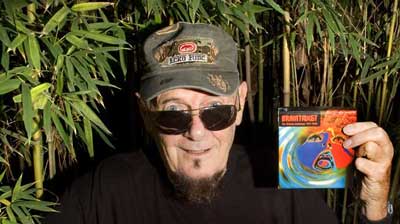 Strange, magical or just plain inspiring, Joel
Vandroogenbroeck's music always makes an impact, as a lot of
people who stumbled upon it have discovered. “There are about
100 bootlegs of Brainticket out there,” says the composer with a
laugh, “and one of the albums included in this new release by
Cleopatra, called Live in Rome, is a recording I never even knew
existed!” Strange, magical or just plain inspiring, Joel
Vandroogenbroeck's music always makes an impact, as a lot of
people who stumbled upon it have discovered. “There are about
100 bootlegs of Brainticket out there,” says the composer with a
laugh, “and one of the albums included in this new release by
Cleopatra, called Live in Rome, is a recording I never even knew
existed!”
The Space Rock Invasion USA Tour was organized around the
beginning of 2011 and since then VDB has flown to Los Angeles
several times for rehearsals. “We’re lucky to have Abby Travis
with us doing vocals for Brainticket, he says. “She’s just
amazing.” When asked if he’ll be taking his Synthi A synthesizer
on tour, Joel looked wistful. “This is the same kind Pink Floyd
used in Dark Side of the Moon and I love the sound, but nowadays
you can’t take something so big and suspicious on a plane.
Instead,” he said, picking up his iPad, “I’ll be using this.”
The technology may have changed, but it’s the master’s touch
that makes the magic and after all these years, Joel
Vandroogenbroeck still has that magic touch.
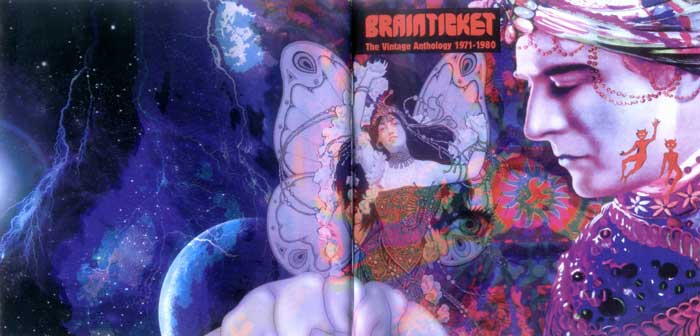
|
